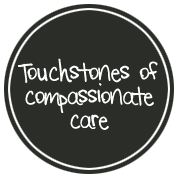Friday Food For Thought
Every once in a while I come across a book or an article containing information that I can relate to and that I can actually apply to my life. Recently, I read this article in Ladies Home Journal. It’s an easy read and contains information that can be easily applied. For myself, I am trying to be better at incorporating Key No. 1 into my daily life – not believing my negative thoughts. As a perfectionist, I tend to be a glass half empty rather than a glass half full kind of person. But according to this article, it’s never too late to learn to be happy. Hopefully, there’s something in this article that you can relate to and apply to your life.
Have a Happy Friday!
Research shows that habitual thoughts and behaviors create specific neural pathway in the wiring in our brains, the way water flowing downhill creates a groove in the earth. When we think or behave a certain way over and over, the neural pathway is strengthened and the groove becomes deeper. Unhappy people tend to have more negative neural pathways – their minds are literally stuck in a rut.
Scientists used to think these neural pathways were set in stone. But new research shows that when you repeatedly think, feel and act in a different way, the brain actually rewires itself. This means that you can change your happiness set point. A leading brain researcher said “Based on what we know about the plasticity of the brain, we can think of happiness as a skill no different from learning to play a musical instrument . . . it is possible to train our minds to be happy.
FIVE KEYS TO HAPPINESS:
1. Don’t Believe Everything You Think. According to medical experts, we have an average of 60,000 thoughts a day and of those 60,000 thoughts, 95 percent are the same thoughts we had yesterday, and the day before, and the day before that. What's worse is that for the average person, the vast majority of those habitual thoughts are negative. For adaptive reasons, we humans have an inborn tendency to register negative thoughts, feelings and experiences more deeply than positive ones. We're hardwired for negativity. If we get 10 compliments and one criticism, what do we remember? But we can tinker with the wiring. Happy people are skeptical of their negative thoughts and have learned not to let false alarms hijack their happiness.
2. Notice the Happy Things In Your Life – No Matter How Small. One evening a Cherokee elder told his grandson about the battle that goes on inside people’s heads. He said “my son, the battle is between the two “wolves” that live inside us all. One is Unhappiness. It is fear, worry, anger, jealousy, sorrow, self-pity, resentment and inferiority. The other is Happiness. It is joy, love, hope, serenity, kindness, generosity, truth and compassion”. The grandson asked his grandfather, “Which wolf wins?” The old Cherokee replied, “The one you feed.” Because of our negativity bias, we often feed the wrong wolf. To be happier, you need to even up the score. Happy people make a point of noticing everything good that happens to them: any positive thought they have, anything they see, feel, taste, hear or smell that brings them pleasure. This intention activates the reticular activating system (RAS), a group of cells of the brain stem that are responsible for turning on your memory system and allowing it to bring anything important to your attention. When you decide to look for the positive, your RAS makes sure that’s what you see. Once you notice something positive, take a few moments to savor it – making a habit of feeding happiness.
3. Choose the Happier Thought. The next time you’re faced with a challenging situation that gives rise to negative thoughts and bad feelings, find an equally true thought about the situation that makes you feel better – and lean into it. This doesn’t mean deny the negative – just pay more attention to the positive part of the truth. A real life example: Have you ever been on a deadline and thought, I can’t get this done in time? The next time you are having a negative, self-defeating thought like that, search your mind for positive thoughts that are equally true, like I always manage to get things done. I can ask for help. The more I relax, the more the ideas flow through me. Lean into those thoughts and you’ll find yourself feeling better.
4. Tend to Your Relationships. Scores of studies have demonstrated that having good social relationships are one of the strongest predictors of happiness. For women, relationships may be even more important. Though men and women both release adrenaline and cortisol when under stress, scientists found that women’s brains also release oxytocin, the bonding hormone. That is why women who are going through a rough time often want to have a good long yak fest with a close girlfriend. The more women engage in bonding activities, the more oxytocin they release, producing a calming influence and further lowering their stress. So the next time you’re upset or feeling stressed, don’t say you don’t have time for friends and family. This is when you need them the most. The best way to keep relationships happy, healthy and supportive can be summed up in one word: appreciation. One of the most important things a person can do to raise his or her happiness level is to acknowledge those around them. When someone is acknowledged, dopamine is released – a neurochemical that’s directly related to being happy. When we demonstrate our appreciation for the support we receive from others, it reinforces that behavior and deepens our connection to them.
5. Find Passion and Purpose. Happy people bring a sense of purpose to any activity. Bringing a sense of passion to mundane activities will boost your happiness, but so will taking the time to find your true passions. Think about what activities most absorb you and analyze what it is about those activities that makes you happy. Happy people incorporate passion into their daily lives, whether at work or at home.









5 comments:
Good lesson in CBT (Cognitive Behavioral Therapy). There is clearly (the point of you're article, eh?) evidence making an effort to think more positively does improve your mood and depressive/anxious tendencies. Just about as much as using meds.
It is hard to get started and keep it up, however! Especially under stress!
Cheers to happy thoughts! :)
Good article. Have a great weekend. Carpe Diem!!!
What a perfect day for me to happen upon this ! Thanks for sharing it !
Thanks for sharing this Ann, definitely food for thought. I tend to be a glass half full person myself, I try to look for the best in everything, though there are definitely some days when that just doesn't work!
xxx
Thanks for sharing Ann. I needed to read this at 5 o'clock in the morning when we haven't had a nurse all weekend. I sure am thinking negatively towards the nursing agency and pitying our situation right now. I guess it's not too late to try and think happy thoughts.
Love
Rachel
Post a Comment